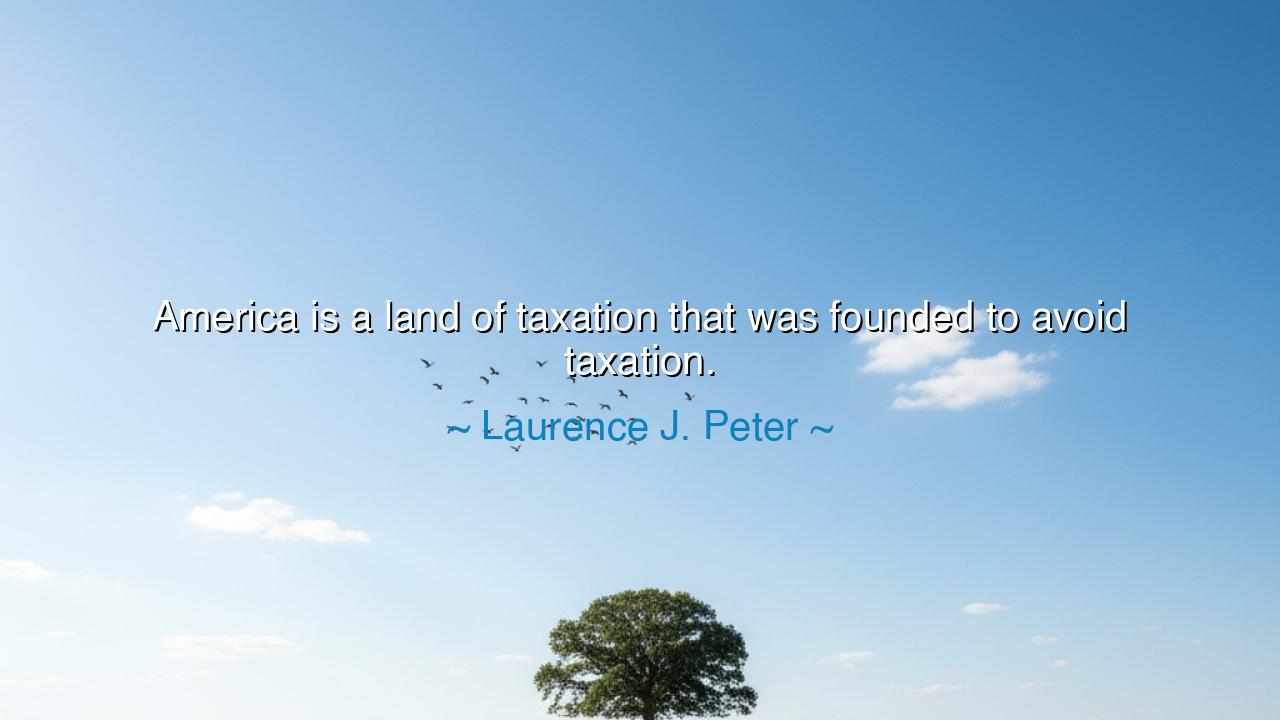
America is a land of taxation that was founded to avoid taxation.






In the wry humor of the scholar Laurence J. Peter, author of The Peter Principle, lies a truth as sharp as a blade cloaked in jest: “America is a land of taxation that was founded to avoid taxation.” At first, these words seem to mock the contradictions of history, yet beneath their wit lies a profound reflection on the cycles of power, liberty, and human forgetfulness. Peter, a man who studied the follies of bureaucracy and the ironies of human behavior, spoke as a prophet disguised as a humorist. His words are both a satire and a warning — that the very nation born of rebellion against taxation has become a kingdom of taxes itself, a reminder that freedom, once taken for granted, bends quietly under the weight of its own institutions.
The origin of this truth lies in the fiery birth of the United States, when colonists, weary of being burdened by distant kings, rose in protest against what they deemed unjust tribute. “No taxation without representation!” they cried, as British levies on tea, stamps, and paper became symbols of tyranny. The war that followed was not only for independence of land but for the dignity of labor — the belief that what a man earns by his sweat should not be taken without his consent. The Revolution was, in essence, a struggle for ownership — of one’s life, one’s property, one’s destiny. And so, the founders built a republic where government would serve the people, not plunder them; where taxation, if necessary, would be light and just, a servant of liberty, not its master.
But as centuries turned, Peter observed what the ancients would have called the great irony of fate — that every revolution eventually becomes what it once opposed. The small, humble government of Washington’s time, built to protect freedom, grew vast and complex as the nation itself expanded. Laws multiplied, bureaus arose, and the machinery of the state demanded ever more fuel to run. And that fuel was taxation. Thus, the land that once threw tea into the harbor now brews oceans of paperwork; the people who once rose against tariffs and duties now labor under taxes too numerous to count. What began as resistance to tribute became submission to bureaucracy.
History is filled with such reversals. Rome, once a republic that despised kings, became the mightiest empire ruled by emperors. Its citizens, proud and free, allowed power to concentrate in the hands of a few, so long as their bread and circuses continued. So too with America, Peter implies. The people who once demanded liberty from foreign taxes now tolerate — even defend — domestic ones, so long as comfort remains. It is not the taxes alone that concern him, but the spirit that has changed: the loss of that fiery independence that once said, “Enough!” when government grew too bold. The chains are lighter now, but they bind just the same.
Yet Peter’s words are not merely cynical — they are deeply instructive. He reminds us that taxation, like government itself, is not evil by nature but dangerous by excess. Taxes build roads, fund schools, and defend the nation, yet they also tempt rulers to overreach. The problem, he suggests, is not that we are taxed, but that we have forgotten why we once resisted. We no longer question how much is taken or how wisely it is spent. When citizens cease to guard their freedom, governments, even those born in liberty, grow fat upon their trust. America, he warns, must remember that liberty dies not in one great battle, but in a thousand quiet concessions.
Consider the story of Shays’ Rebellion in 1786, only a few years after the Revolution. Farmers in Massachusetts, veterans of the war for freedom, found themselves crushed by taxes levied by their own state — taxes harsher than those once imposed by the British crown. They rose in protest, not to destroy the new republic, but to remind it of its purpose. Their uprising was a painful mirror held before a young nation: freedom, if not protected, swiftly breeds the same oppressions it once cast off. Their cry echoes still: that liberty must be defended not once, but always, in every generation.
The lesson, then, is one of vigilance and humility. The cycle of power repeats because human nature forgets. Every government begins with noble intent, and every tax with a promise of good. But when the people become complacent, and when the government grows accustomed to its appetite, the servant becomes the master. The cure lies not in rebellion alone, but in responsibility — in citizens who question, who participate, who remember that freedom is not a gift, but a discipline.
So, my child of liberty, remember the wit and wisdom of Laurence J. Peter. Laugh at the irony, yes, but understand its warning. Do not despise taxes, but guard them; do not distrust government, but limit it; do not forget the dream for which your forefathers fought — that what you earn, you may keep, and what you give, you give by choice, not by compulsion. For when America remembers that the purpose of government is to serve the people, not consume them, then it shall be again what it was at its birth — a land not of taxation, but of freedom.






AAdministratorAdministrator
Welcome, honored guests. Please leave a comment, we will respond soon